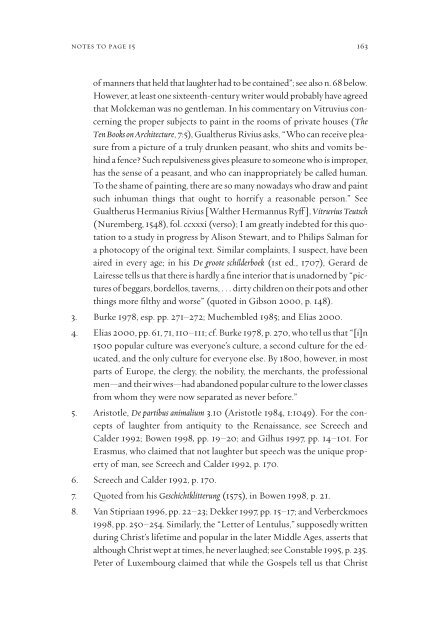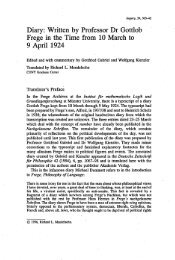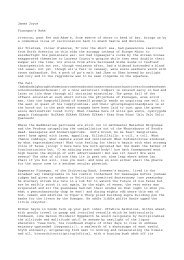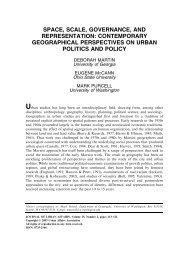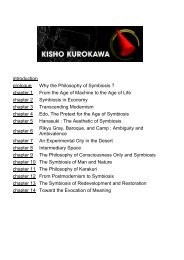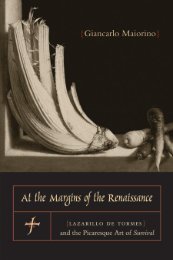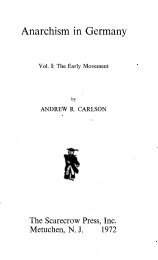Pieter Bruegel and the Art of Laughter - AAAARG.ORG
Pieter Bruegel and the Art of Laughter - AAAARG.ORG
Pieter Bruegel and the Art of Laughter - AAAARG.ORG
Create successful ePaper yourself
Turn your PDF publications into a flip-book with our unique Google optimized e-Paper software.
notes to page 15 163<br />
<strong>of</strong> manners that held that laughter had to be contained”; see also n. 68 below.<br />
However, at least one sixteenth-century writer would probably have agreed<br />
that Molckeman was no gentleman. In his commentary on Vitruvius concerning<br />
<strong>the</strong> proper subjects to paint in <strong>the</strong> rooms <strong>of</strong> private houses (The<br />
Ten Books on Architecture, 7:5), Gual<strong>the</strong>rus Rivius asks, “Who can receive pleasure<br />
from a picture <strong>of</strong> a truly drunken peasant, who shits <strong>and</strong> vomits behind<br />
a fence? Such repulsiveness gives pleasure to someone who is improper,<br />
has <strong>the</strong> sense <strong>of</strong> a peasant, <strong>and</strong> who can inappropriately be called human.<br />
To <strong>the</strong> shame <strong>of</strong> painting, <strong>the</strong>re are so many nowadays who draw <strong>and</strong> paint<br />
such inhuman things that ought to horrify a reasonable person.” See<br />
Gual<strong>the</strong>rus Hermanius Rivius [Wal<strong>the</strong>r Hermannus Ryª ], Vitruvius Teutsch<br />
(Nuremberg, 1548), fol. ccxxxi (verso); I am greatly indebted for this quotation<br />
to a study in progress by Alison Stewart, <strong>and</strong> to Philips Salman for<br />
a photocopy <strong>of</strong> <strong>the</strong> original text. Similar complaints, I suspect, have been<br />
aired in every age; in his De groote schilderboek (1st ed., 1707), Gerard de<br />
Lairesse tells us that <strong>the</strong>re is hardly a fine interior that is unadorned by “pictures<br />
<strong>of</strong> beggars, bordellos, taverns, . . . dirty children on <strong>the</strong>ir pots <strong>and</strong> o<strong>the</strong>r<br />
things more filthy <strong>and</strong> worse” (quoted in Gibson 2000, p. 148).<br />
3. Burke 1978, esp. pp. 271–272; Muchembled 1985; <strong>and</strong> Elias 2000.<br />
4. Elias 2000, pp. 61, 71, 110–111; cf. Burke 1978, p. 270, who tell us that “[i]n<br />
1500 popular culture was everyone’s culture, a second culture for <strong>the</strong> educated,<br />
<strong>and</strong> <strong>the</strong> only culture for everyone else. By 1800, however, in most<br />
parts <strong>of</strong> Europe, <strong>the</strong> clergy, <strong>the</strong> nobility, <strong>the</strong> merchants, <strong>the</strong> pr<strong>of</strong>essional<br />
men—<strong>and</strong> <strong>the</strong>ir wives—had ab<strong>and</strong>oned popular culture to <strong>the</strong> lower classes<br />
from whom <strong>the</strong>y were now separated as never before.”<br />
5. Aristotle, De partibus animalium 3.10 (Aristotle 1984, 1:1049). For <strong>the</strong> concepts<br />
<strong>of</strong> laughter from antiquity to <strong>the</strong> Renaissance, see Screech <strong>and</strong><br />
Calder 1992; Bowen 1998, pp. 19–20; <strong>and</strong> Gilhus 1997, pp. 14–101. For<br />
Erasmus, who claimed that not laughter but speech was <strong>the</strong> unique property<br />
<strong>of</strong> man, see Screech <strong>and</strong> Calder 1992, p. 170.<br />
6. Screech <strong>and</strong> Calder 1992, p. 170.<br />
7. Quoted from his Geschichtklitterung (1575), in Bowen 1998, p. 21.<br />
8. Van Stipriaan 1996, pp. 22–23; Dekker 1997, pp. 15–17; <strong>and</strong> Verberckmoes<br />
1998, pp. 250–254. Similarly, <strong>the</strong> “Letter <strong>of</strong> Lentulus,” supposedly written<br />
during Christ’s lifetime <strong>and</strong> popular in <strong>the</strong> later Middle Ages, asserts that<br />
although Christ wept at times, he never laughed; see Constable 1995, p. 235.<br />
Peter <strong>of</strong> Luxembourg claimed that while <strong>the</strong> Gospels tell us that Christ


